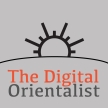
The 29th International Congress of Deutsche Arbeitsgemeinschaft Vorderer Orient (DAVO) took place in cooperation with the “Turkologentag 2023 — Fourth European Convention on Turkic, Ottoman and Turkish Studies” at the University of Vienna (21-23 September 2023).
Previous meetings of the DAVO were the 28th Internationaler DAVO-Kongress (Berlin, 12-17 September 2022), the 27th Internationaler DAVO-Kongress (Osnabrück, 16-18. September 2021), the 26th Internationaler DAVO-Kongress (Hamburg, 3-5 October 2019), and the 25th Internationaler DAVO-Kongress (Frankfurt/Main, 4-6 October 2018).
DAVO2023 hosted several panels referencing Digital Humanities, presenting current research projects based on digital infrastructures; additionally, scholars were invited to present their work as examples of the practical use of digital infrastructures in current research projects alongside the regular conference program on dedicated devices using hands-on approaches.
Aysu Akcan
AYSU AKCAN, Universtät Wien, Institut für Orientalistik Department, Graduate Student organized a number of these, so on behalf of #DigitalOrientalist I posed questions to her.
DO: What was your intention with convening panels on “Digital Humanities and Ottoman Studies”?
AYSU AKCAN: In Ottoman Studies, as in many other disciplines, Digital Humanities’ tools, technologies, and epistemological turning points (and turmoil) provide a brand new raison d’être for the discipline and also for the DH itself. Of course, not only in Ottoman Studies, but also in Social Sciences and Humanities in general, those who exercise DH, engage the challenges of the confrontation of digital versus conventional paradigms. That’s the main reason why we should come together more, to bring together the gaps on a critical basis in DH-based studies, which sometimes remain more experimental than the conventional approach to the field.
For example, there is a great need to define and understand the place of DH in Ottoman Studies, which is perhaps in its founding phase, and to exchange ideas about where the central text/archival and source-centered readings are blocked and where DH can open a new channel and transform our ways of “close” readings.
For this reason, we, as Near East Studies at the University of Vienna, try to conduct not only panels titled DH in Ottoman Studies but also workshops, which is also the first workshop themed on “Ottoman Studies and DH”, and discussion sessions with small working groups on a regular basis.
DO: In what way do these panels represent a “first” for you as organizers?
AYSU AKCAN: In addition to the people who take part in DH-based conferences and workshops, Turkologentag is a very large organization that hosts more than 800 people working in the field of Turkish, Turkic, and Ottoman Studies. For this reason, the DH panel at Turkologentag brought together many scholars who are aware of the field but have not had the opportunity to engage closely with the work and who require more details by having engagement. For this reason, the DH panel at Turkologentag brought together many scholars who are aware of the field but have not had the opportunity to engage closely with the work and require more details to evaluate the projects.
DO: What do you as conveners expect from these panels in terms of long-term impact?
AYSU AKCAN: Over the course of time, such panels will play a critical role and impact DH research/approaches in Ottoman Studies by criticizing and evaluating it, while also bringing attention to the difficulties facing this fledgling discipline. Additionally, over time, these panels will motivate the field by bringing attention to the issues that require understanding, especially the challenging parts of the DH for the researchers. This is going to inspire more people to become involved by having them think more critically.
DO: What directions in the digital humanities do you admire?
AYSU AKCAN: In particular, the direction of DH in the field of Ottoman Studies is focused more on text recognition systems, tools, and algorithms which will cause systematic, and scholarly editions of texts and archival sources, and rapid and accurate access to metadata information which will lead to the advancement of digital dictionaries, language models, concordance and so on.
DO: What would you like to do next?
AYSU AKCAN: To organize workshops and working groups by staying in more contact with people working in the field of DH, who are aware of this field, but who are both hesitant and curious about integrating this interdisciplinary field into their work.
Ülker Sözen
In addition, I was lucky enough to catch up with Ülker Sözen (Universität Leipzig, Institut für Religionswissenschaft Department, Post-Doc), to pose one question.
DIGITAL ORIENTALIST: Would you tell me more about your current project, “Preaching and Negotiating Romantic Love and Religiosity on Turkish TikTok”?
ÜLKER SÖZEN:
“What should a young Muslim who has caught the malady of love do?” İhsan Şenocak, a popular public preacher, addresses this question during one of his religious guidance programs posted on YouTube dating back to 2016. In his response, Şenocak begins with distinguishing lust and love wherein the only true love is for Allah and the way of Islam. He advises that turning to Islam and contemplating the finitude of life would cure the “malady of love”, which is worldly, bound with mortality, hence transient and deceptive. In the following years, the video clip and the question went viral on various social media platforms, most prominently on TikTok, engendering a discursive field composed of memeified communication and articulations which negotiate the experiences, emotions, and expectations regarding romantic love with religiosity.
Considering the Islamic cultural landscape in Turkey, the dichotomy of “divine love” versus “worldly/ human love” is invoked in ways responding to the moral anxieties emanating from modernity and its potential effects to disturb the reproduction of religious values and the conservative patriarchal family. Premarital romance and flirting practices among the youth constitute a major source of moral anxiety for religious and political authorities in contemporary Turkey as they seek to regulate the youth’s romantic and sexual desires through family-centric conservative discourses and policies. In this respect, various social media preachers and online Islamic education channels produce content that targets the youth and dictates proper conduct regarding relations with the opposite gender, sexuality, family, and marriage. TikTok is actively utilized for reaching out to the youth by these content producers with the purpose of irşad, namely preaching in the form of religious guidance and mentoring. In addition to these irşad accounts, which are often tied to religious education and cultural centers, the prolific discursive space on TikTok includes ordinary individual users who self-identify as Muslim and share their perspectives and expectations about romantic love by drawing on Islamic teachings, customs, and symbols.
TikTok is the fastest growing social media platform in Turkey with more than 30 million users and a profound popularity among the youth. The platform allows sharing and viewing short videos that feature music, textual annotations, and interactive filters.
It blends the senses of intimacy and publicness via the memeification of everyday life and personal experiences, which enhances relatability and increases user interactions. The articulations on TikTok that construe love and intimacy with reference to Islamic elements are far more complex than only promoting Islamic norms about romantic relationships. They express desires, grievances, and expectations that surpass the framework of piety and denote gendered and class-related conceptions of love, intimacy, and romantic relationships. Furthermore, these articulations are embedded within and informed by Tiktok’s platform affordances that connect users around memes, hashtags, trends, and sounds, enacting intimate publics. These networks move beyond local and national frameworks as they entail circulations at the transnational level as well, of musical tastes, fads and fashions, and lifestyle patterns, specifically with respect to an online Muslim popular culture landscape.
Building on these insights, this presentation will reflect on the TikTok content in Turkish language produced by and for young Muslim users regarding love and religiosity. It seeks to unpack the complex terrain of cultural discourses and networked subjectivities on TikTok by examining the discursive fields around first, the “what should a young Muslim in the malady of love do” meme and second, the hashtag “helalaşk” (halal love), that refers to religiously permissible love. While tackling this case, the presentation will benefit from the “Digital Religion Studies” literature and the discussions on the mediatization of religion and secularity along with the concept of “digital public of intimacy”.
Literature
- Heidi A. Campbell (2017) Religious communication and technology, Annals of the International Communication Association, 41:3-4, 228-234, DOI: 10.1080/23808985.2017.1374200
- Stig Hjarvard (2016). Mediatization and the changing authority of religion. Media, Culture & Society, 38(1), 8–17, DOI: 10.1177/0163443715615412
